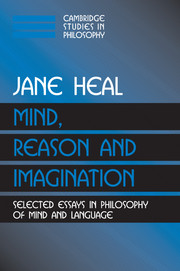Book contents
- Frontmatter
- Contents
- Preface
- Sources
- Mind, Reason and Imagination
- 1 Introduction
- PART I MIND, THEORY AND IMAGINATION
- PART II THOUGHT AND REASON
- PART III INDEXICAL PREDICATES AND THEIR APPLICATIONS
- PART IV THINKING OF MINDS AND INTERACTING WITH PERSONS
- 12 What Are Psychological Concepts For?
- 13 Moore's Paradox: A Wittgensteinian Approach
- 14 On First-Person Authority
- References
- Index
13 - Moore's Paradox: A Wittgensteinian Approach
Published online by Cambridge University Press: 18 December 2009
- Frontmatter
- Contents
- Preface
- Sources
- Mind, Reason and Imagination
- 1 Introduction
- PART I MIND, THEORY AND IMAGINATION
- PART II THOUGHT AND REASON
- PART III INDEXICAL PREDICATES AND THEIR APPLICATIONS
- PART IV THINKING OF MINDS AND INTERACTING WITH PERSONS
- 12 What Are Psychological Concepts For?
- 13 Moore's Paradox: A Wittgensteinian Approach
- 14 On First-Person Authority
- References
- Index
Summary
INTRODUCTION
‘I believe that it is raining but it isn't’. It would be perfectly absurd, claimed Moore, to say this or its like (Moore 1942: 540–543; 1944: 204). But why? After all, it is clearly possible that I could believe that it is raining when it is not and that others should realise and remark on the error I make. Why should my doing so myself be somehow absurd?
My aim in this essay is to suggest that Wittgenstein's approach to this issue has much to recommend it, and that seeing its attraction might provide an entry point to understanding the nature of Wittgenstein's later philosophy of mind (Wittgenstein 1953: 190–192; 1980: 90–96). A proper account of that is clearly beyond the scope of this essay and moreover could not be given without treating those issues of meaning and metaphysics which Wittgenstein discusses in the early part of the Investigations, before he moves on to reflect on psychological concepts. So my object is to consider some features of the paradox in detail but only to gesture in the direction of the larger topics, in a way that may at least make it seem worthwhile to look into them further.
The next section outlines the paradox slightly more fully and suggests two conditions that a satisfactory solution should meet. It sketches two possible approaches to the matter, the Wittgensteinian (which at this point will not look at all attractive) and the more familiar one initiated by Moore himself.
- Type
- Chapter
- Information
- Mind, Reason and ImaginationSelected Essays in Philosophy of Mind and Language, pp. 250 - 272Publisher: Cambridge University PressPrint publication year: 2003



